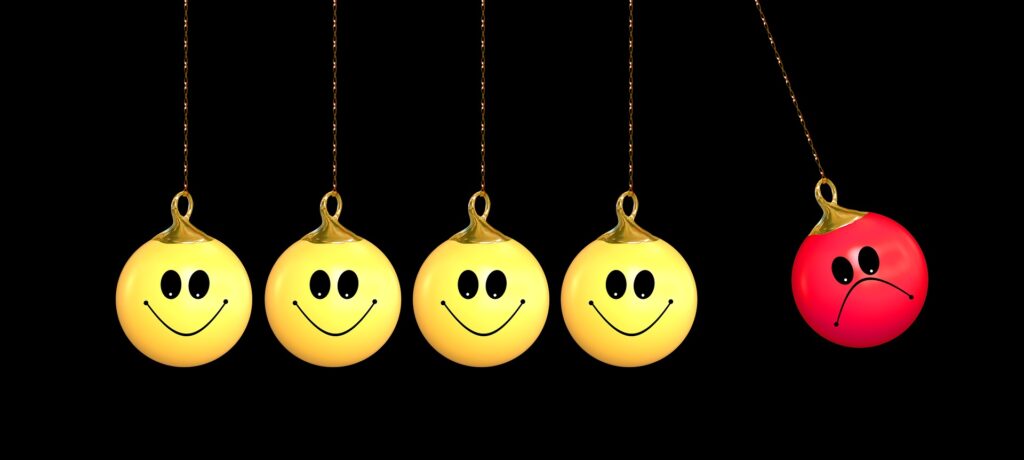8 Signs That You’re Happier than the Majority


Am I happy?
This is a question that people will struggle with answering. We’re told that happiness looks like a certain body type, an impressive stock portfolio and an expensive car. Dreamy partners, beautiful kids, successful careers and people salivating with envy at your life and then you’ll be happy.
These strange, restrictive codes for happiness are monotone and not relatable. Not everyone wants what we are taught to want in order to be happy and that’s why happiness is a unique experience for people. When we don’t want to live these types of lives or haven’t reached these goals yet, we can feel inadequate and dejected. Thankfully, with a shift in perspective, we can identify the happiness in our lives that we already have, instead of focusing on the external things that we want to make us happy. So here are 8 quick signs that you’re happier than the majority (and happier than you might think).
- You Enjoy Doing Nothing

This sounds counter-productive to the hustle and goal setting and meeting culture we have going on but let me explain.
We’re so used to being shamed for not doing anything productive or not working all the time, that sitting still can make some of us feel anxious about not doing more. We even have that horrible mantra that “you’ll rest when you’re dead.” I would really rather not.
I’m not saying don’t work at all. We need to work but I believe that we need to incorporate more balance into our lives. Marry ease with effort. Make time for doing something and doing nothing. If you’re able to be comfortable with doing nothing, no anxiety attached, you have unlocked a happiness level.
- You Aren’t Intimidated By Others People’s Success

When you hear that a friend, family member or even an internet fave that you’ve been following has started their own business, health journey or therapy sessions, you’re absolutely delighted for them and proud of them. You might not know the extent of what it took for them to get there but for them to have a positive event happen for them warms your heart.
No one’s success threatens or intimidates you because you have a high self-esteem and you know that you’re not in competition with anyone to reach a certain destination because we all live different lives. You don’t have to obviously change the subject, gossip about them or put them down to feel better about yourself. You’re already happy and feel good about yourself.
- You Learn Something New Everyday

All of life is a series of lessons and regardless of how it goes, well or horribly, you absorb something from that lesson. Even with my personal daily routine of listing things I’m grateful for, I learn to be grateful for something I hadn’t thought about as being capable of being a lesson.
Having a curiosity for learning and actually learning and applying what you’ve learnt makes you happy and strong. It can be something that you’ve wanted to do for a long time or you thought you couldn’t perhaps because of age, previous circumstances or financial constraints. It might be learning to cook healthy or new meals, getting your driver’s licence, learning an art form or swimming. By learning how to do it bit by bit, you incorporate confidence in yourself and your knowledge of the skill grows, just like your happiness levels.
- You Don’t Live In The Past

Since the past is the first place we’ve been in our lives, we are subconsciously connected to it. We use it as a point of reference for what to do and what not to do. This is not inherently a bad thing.
We experience problems when we decide to live in the past. That robs us of the present and the future potential that focusing on it has. It would be better to take action on what we want to do and not only survive, but thrive. We have to learn to overcome the past, embrace our individual lives and live in the present moment. We also have to forgive ourselves and other people for their mistakes. Healing from the past is another important part of achieving happiness.
- You Don’t Ignore Negative Emotions

Truly happy people don’t ignore their emotions, not any of them. They don’t tell you to only give them good news and only have positive vibes and live in a happiness bubble where no negativity is allowed.
Toxic positivity is a destructive coping mechanism because you’re forcing yourself to feel an emotion you can’t reasonably expect to feel all the time. It also ignores your other normal emotions like disappointment, anger or sadness, our more “negative” emotions.
In truth, because we have been conditioned to generally see these emotions as negative, we try to stay away from expressing and feeling them for fear of being branded as angry and unpleasant. Happy people have learned to not shy away from these feelings but to instead validate them by feeling them and knowing that this emotion will pass.
- You Enjoy Helping People

Spreading goodwill to other people makes us feel good and warm on the inside. It reminds us of the blessings that we have and how fortunate we are to be able to help and give to ourselves and in turn give to others.
An interesting point made by Jeff Haden, contributing editor of Inc.com is that while we can’t always make others help us, even if we absolutely need it or want it, we can control if we can help someone else and that can create happiness too.
Helping doesn’t have to be a big demonstration of how wealthy or powerful you are. Small, meaningful gestures are just as effective. Volunteering at shelters or for causes you’re passionate about, errands for friends, family, neighbours or even colleagues or being a sympathetic ear for someone who needs it.
- You Have Good Friends

Having a good support system in the form of true friends is amazing. You live a happier life.
As we focus on creating career connections and networking with colleagues, employers and other professionals which is important too, we also need to remember the importance of real friends. Internet friends are awesome too, but we should also expand our reach and have real life friends, which are more important for single, divorced or widowed people.
A study by Helliwell and Huang found that increasing the number of friends you have correlates to higher subjective well-being. I believe that with friendship, we need to have a strong focus on quality instead of quantity because who would want fair weather friends that are nowhere to be found when you need them and then come around when they need something from you? So while it’s important to have friends, I think it’s better to have 3 good ones then 9 okay ones.
- You Express Gratitude Often

Expressing gratitude often and even on a daily basis is a healthy practice for making you happier by helping you focus on what you have instead of what you don’t have. You remind yourself of the many great things you’ve already accomplished and will still accomplish, and you don’t let the bad things go to your heart and stay there or the good things get to your head and stay there too.
A 2003 study by Emmons and McCullough found that people who wrote what they were grateful for every week for 10 weeks had a 25% increase in their happiness, were more optimistic about the future and increased their exercise more than the other groups that focused exclusively on problems and inconveniences.
Gratitude is a booster for happiness because “happiness levels are stable over the long-term” ,according to the study. So if you were to win the lottery or get into a minor car accident, you would, after 3 to 6 months, return to your usual level of happiness. This means that you can increase and control your own happiness.
We all want to be happy and the good news is that we can boost and maintain our average happiness levels. We also know to stay away from those who don’t want to be happy and how we can’t make everyone feel how we want them to feel, even if we believe it’s for their own good. Happiness is a choice. We can start by basing it on our accomplishments and the blessings we have been given.
REFERENCES
Dean, J., 2016. Practicing gratitude can increase happiness by 25%. PsyBlog. Available at: https://www.spring.org.uk/2007/09/practicing-gratitude-can-increase.php [Accessed September 15, 2021].
Haden, J., 2019. If you say yes to any of these 7 questions, science says you’re much happier than you think. Inc.com. Available at: https://www.inc.com/jeff-haden/if-you-say-yes-to-any-of-these-7-questions-science-says-youre-much-happier-than-you-think.html [Accessed September 15, 2021].
Helliwell, J.F. & Huang, H., 2013. Comparing the happiness effects of real and on-line friends. PLoS ONE, 8(9). Available at: https://journals.plos.org/plosone/article?id=10.1371/journal.pone.0072754 [Accessed September 15, 2021].
Sharma, D., 2015. 10 signs you’re genuinely happy (though you don’t realize it). Lifehack. Available at: https://www.lifehack.org/articles/communication/10-signs-youre-genuinely-happy-though-you-dont-realize.html [Accessed September 15, 2021].
Unknown, 2021. 7 Signs that you’re happier than the majority . Login • instagram. Available at: https://www.instagram.com/p/CTMM3z_iYtJ/ [Accessed September 15, 2021].
Yeung, A.J., 2021. 10 signs you’re happy from the happiest people I’ve ever met. Medium. Available at: https://medium.com/mind-cafe/10-signs-youre-happy-from-the-happiest-people-i-ve-ever-met-f9a555018a60 [Accessed September 15, 2021].



Responses